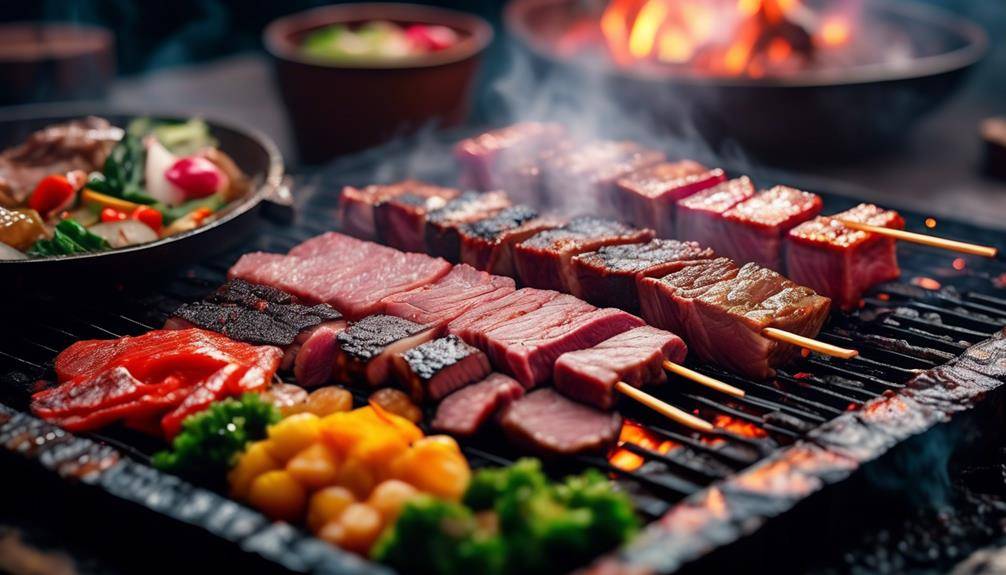Exciting Greek Coffee And Its Cultural Significance

Greek Coffee And Its Cultural Significance; Have you ever wondered how a simple cup of coffee can hold such cultural significance? Greek coffee, with its rich history and unique preparation method, has become an integral part of Greek culture.
From the bustling coffee houses that serve as social hubs, to the symbolism of coffee in hospitality, Greek coffee has forged deep connections between people and their traditions. But there’s more to Greek coffee than meets the eye. In this discussion, we will explore the rituals, customs, and health benefits associated with Greek coffee, as well as its role in contemporary Greek society. So, grab a cup and join us on this journey to uncover the cultural significance of Greek coffee.
Historical Origins of Greek Coffee
Greek coffee, also known as ‘ellinikos kafes,’ has a rich and fascinating history that dates back centuries. The historical significance of Greek coffee lies in its deep roots within Greek culture and its cultural impact on the people of Greece. The origins of Greek coffee can be traced back to the Ottoman Empire, which ruled over Greece for nearly four centuries.
During this time, the Ottoman Turks introduced coffee to Greece, and it quickly became a popular beverage among the Greeks. Coffee houses, known as kafeneia, began to spring up in cities and towns, serving as social hubs where people would gather to discuss politics, philosophy, and everyday matters. These kafeneia played a vital role in shaping Greek society and fostering a sense of community.
Greek coffee is prepared using a unique brewing method that involves boiling finely ground coffee beans in a small pot called a briki. The coffee is then poured into small cups, and the grounds settle at the bottom, creating a thick and strong brew. This traditional brewing method has been passed down through generations, preserving the cultural heritage of Greek coffee.
To this day, Greek coffee remains an integral part of Greek culture. It is not just a beverage but a symbol of hospitality, friendship, and tradition. It is often served with a glass of water to cleanse the palate and a small treat, such as a spoonful of loukoumi (Turkish delight) or a piece of baklava. Greek coffee ceremonies are still performed in homes and cafes, keeping the customs and rituals alive.
Traditional Preparation Method
As we delve into the traditional preparation method of Greek coffee, it is important to understand the meticulous process that has been passed down through generations, preserving the cultural heritage of this beloved beverage. Greek coffee is brewed in a unique way that sets it apart from other coffee traditions. Here is a step-by-step guide to the traditional brewing process:
- Selecting the coffee: Greek coffee is typically made using finely ground coffee beans. The beans are often a blend of different varieties, creating a distinct flavor profile.
- Measuring the ingredients: The amount of coffee used depends on personal preference, but a general rule of thumb is one heaped teaspoon per demitasse cup. The amount of sugar can also be adjusted to taste.
- Brewing the coffee: The coffee is brewed in a small pot called a briki. Water is added to the briki, and then the coffee and sugar are stirred in. The mixture is heated slowly over a low flame.
- Frothing the coffee: As the coffee heats up, it begins to froth. This froth, known as kaimaki, is an essential part of the Greek coffee experience. The pot is removed from the heat just before the coffee comes to a boil to preserve the froth.
- Serving the coffee: Greek coffee is traditionally served in small cups accompanied by a glass of water. The coffee is poured slowly, allowing the grounds to settle at the bottom of the cup.
The traditional brewing method of Greek coffee holds great cultural significance. It is not only a way to prepare a delicious beverage, but it also represents the traditions, rituals, and social connections that are deeply ingrained in Greek culture. By preserving this traditional method, Greeks are able to pass on their cultural heritage to future generations.
Importance of Coffee Houses in Greek Culture
Coffee houses in Greek culture have long been an integral part of social interaction and intellectual discourse. The importance of coffee culture and the cultural significance of coffee houses cannot be overstated. These establishments have served as gathering places for people from all walks of life, fostering a sense of community and camaraderie.
Greek coffee houses, known as “kafeneia,” have a rich history dating back centuries. They have played a crucial role in shaping Greek society, serving as venues for political discussions, philosophical debates, and artistic collaborations. These establishments have acted as incubators of ideas, where intellectuals and artists would convene to exchange thoughts and challenge each other’s perspectives.
The cultural significance of coffee houses in Greek society goes beyond mere socialization. They have been instrumental in shaping Greek identity and fostering a sense of national pride. Throughout history, coffee houses have been hotbeds of political activism, serving as meeting places for revolutionaries and freedom fighters. It was in these establishments that ideas of independence and democracy were born and nurtured.
Moreover, coffee houses have provided a platform for the preservation and promotion of Greek cultural traditions. They have been spaces where traditional music, poetry, and storytelling have thrived. These establishments have served as stages for renowned musicians and poets to showcase their talents, contributing to the preservation of Greek heritage.
Symbolism of Greek Coffee in Hospitality
The ritualistic preparation and presentation of a steaming cup of Greek coffee serves as a symbolic gesture of warm hospitality and welcoming gestures. In Greek culture, serving coffee is a way to show respect and create a sense of community. The symbolism in coffee goes beyond the beverage itself, encompassing the entire process from brewing to serving. Here are three aspects of Greek coffee that highlight its cultural significance:
- Preparation: Greek coffee is prepared with care and precision. The coffee beans are ground to a fine powder and then mixed with water and sugar in a traditional pot called a briki. The mixture is heated slowly over low flames, allowing the flavors to develop gradually. This meticulous preparation process reflects the value placed on attention to detail and the importance of taking time to connect with others.
- Presentation: Greek coffee is traditionally served in small cups called demitasses, accompanied by a glass of water and a small sweet treat, such as a spoonful of loukoumi (Greek delight). The presentation of the coffee and its accompaniments showcases the host’s thoughtfulness and desire to provide a complete and enjoyable experience for their guests.
- Sharing: Greek coffee is often enjoyed in the company of others. It is common for friends and family members to gather around a table, engage in conversation, and savor the rich flavors of the coffee together. This act of sharing fosters a sense of togetherness and strengthens social bonds, emphasizing the importance of human connection in Greek culture.
The symbolism of Greek coffee in hospitality is deeply ingrained in Greek traditions. It represents more than just a beverage; it embodies the cultural values of warmth, generosity, and community. By offering a cup of Greek coffee, hosts extend their hospitality and create an inviting atmosphere for their guests.
Coffee as a Social Bonding Ritual
With its deep cultural significance in Greek hospitality, the symbolic act of serving Greek coffee transcends mere beverage consumption and instead becomes a powerful social bonding ritual. Coffee, in Greek culture, is not just a drink; it is a cultural tradition that symbolizes friendship and connection. Greek coffee is served in small cups, which encourages people to sit together and engage in meaningful conversations. The preparation process itself is an integral part of the social interaction, as it requires time and attention.
In Greece, the act of serving coffee is seen as a gesture of friendship and hospitality. When you invite someone over and offer them coffee, you are not just providing them with a beverage; you are expressing your desire to spend time with them and create a bond. Coffee becomes a catalyst for connection, allowing people to come together and share stories, laughter, and even deep conversations.
Greek coffee is often prepared by the host, who takes pride in the process. The coffee is brewed slowly over low heat, allowing the flavors to develop and the aroma to fill the room. This slow brewing process creates a sense of anticipation and encourages people to slow down and savor the moment. As the coffee is poured into the cups, the host carefully distributes the foam, ensuring that each cup is equally enjoyable.
When you drink Greek coffee with someone, you are not just sharing a drink; you are sharing a moment. The act of sipping the coffee together creates a sense of unity and connection. The rich flavor and strong aroma of the coffee add to the sensory experience, making the moment even more memorable.
Greek Coffee and Family Gatherings
When it comes to Greek coffee and family gatherings, the tradition runs deep. Greek coffee has long been a staple at family gatherings, serving as a symbol of connection and togetherness. With each cup of coffee shared, families bond and create lasting memories that are passed down through generations.
Coffee as a Tradition
Greek coffee holds a significant place in the cultural traditions of Greece, serving as a cherished element of family gatherings and fostering a sense of connection and togetherness. This rich and robust beverage has been a part of Greek coffee traditions for centuries, passed down from one generation to the next. Its cultural significance can be seen in the following ways:
- Symbol of hospitality: Greek coffee is often served to guests as a gesture of warmth and hospitality. It is a way for the host to welcome their guests and make them feel at home.
- Ritualistic preparation: The process of making Greek coffee involves specific techniques, such as boiling the water and coffee grounds together in a traditional pot called a briki. This ritualistic preparation adds to the cultural significance of the beverage.
- Bonding over coffee: Greek coffee is not just about the drink itself, but also about the experience of sharing it with loved ones. It is common for family members to gather around the table, engaging in meaningful conversations while savoring their coffee.
Greek coffee traditions hold a special place in the hearts of Greeks, reflecting their deep-rooted values of hospitality, tradition, and family bonds.
Coffee Bonding Families
The tradition of gathering around a table to enjoy Greek coffee has long been cherished by families, fostering a sense of connection and togetherness. Coffee has played a significant role in Greek culture for centuries, and it continues to be a central part of family life. Greek coffee traditions hold immense cultural significance, as they provide an opportunity for families to come together, bond, and create lasting memories.
In Greek households, the preparation and serving of coffee is a ritualistic experience. The aroma of freshly brewed coffee fills the air, while family members gather around the table, engaging in conversation and laughter. The process of making Greek coffee involves carefully measuring the water, coffee grounds, and sugar, and then slowly heating the mixture in a traditional briki. As the coffee simmers and the foam rises, it symbolizes the warmth and love shared within the family.
The act of enjoying Greek coffee together creates an atmosphere of intimacy and connection. It allows family members to escape from the busyness of everyday life and spend quality time with one another. The slow sipping of coffee gives ample opportunity for conversations to flow, stories to be shared, and bonds to strengthen. It is during these moments that family traditions are passed down, cultural values are imparted, and relationships are nurtured.
The cultural significance of coffee bonding families extends beyond the act of consuming the beverage itself. It represents a deep-rooted tradition that is passed down through generations, serving as a link to Greek heritage and identity. The shared experience of enjoying Greek coffee binds families together, creating a sense of belonging and pride. It is through these coffee gatherings that the essence of Greek culture is preserved and celebrated.
Coffee Memories Shared
As families gather around the table to enjoy the rich aroma and flavors of Greek coffee, cherished memories are created and shared, weaving a tapestry of connection and warmth. Greek coffee has a unique way of evoking coffee nostalgia, bringing back personal coffee experiences that have been passed down through generations. Here are three ways in which Greek coffee memories are shared:
- Storytelling: As the coffee is being prepared, family members gather to share stories of their own personal coffee experiences. This creates a sense of bonding and allows for the passing down of traditions and cultural practices.
- Recipe Exchange: Greek coffee gatherings often involve the exchange of coffee recipes. Each family has their own unique way of preparing and serving the coffee, and this sharing of recipes allows for a deeper understanding of one another’s traditions.
- Symbolic Meaning: Greek coffee carries a symbolic meaning, representing the coming together of loved ones and the celebration of life’s simple pleasures. This shared symbolism creates a sense of unity and appreciation for the small moments in life.
In this way, Greek coffee not only satisfies the palate but also nourishes the soul, creating lasting memories and deepening family connections.
Coffee Culture in Different Regions of Greece
What makes the coffee culture in different regions of Greece unique and diverse? Greek coffee traditions hold immense cultural significance, and they vary from region to region, adding to the rich tapestry of Greek coffee culture. Each region in Greece has its own distinct way of preparing and serving coffee, showcasing the diverse customs and traditions that have evolved over time.
In the northern regions of Greece, such as Thessaloniki, the coffee culture is heavily influenced by the Ottoman Empire. Here, the traditional method of brewing coffee is using the “briki,” a small copper pot, and serving it in small cups. The coffee is often strong and aromatic, and it is customary to enjoy it with a glass of water.
On the island of Crete, coffee is an integral part of the daily routine, and the Cretans take their coffee seriously. The Cretan coffee, known as “Kafes Ellinikos,” is prepared by boiling finely ground coffee with sugar and water in a special pot called a “hovoli.” It is typically served in small cups, accompanied by a glass of cold water and a traditional Cretan sweet, such as “koulourakia.”
In the Peloponnese region, particularly in the city of Nafplio, the coffee culture is influenced by Italian influences. Here, you will find many cafes serving espresso-based drinks, such as cappuccinos and lattes, alongside the traditional Greek coffee. The cafes in Nafplio are known for their relaxed atmosphere, where locals gather to socialize and enjoy their coffee.
The coffee culture in different regions of Greece reflects the diverse history, traditions, and influences that have shaped the country over centuries. Whether you prefer the strong and aromatic coffee of Thessaloniki, the traditional Cretan coffee, or the Italian-inspired cafes of Nafplio, experiencing the coffee culture in different regions of Greece is a fascinating journey into the heart of Greek tradition and hospitality.
Role of Greek Coffee in Daily Life
Greek coffee plays a significant role in the daily life of Greeks, encompassing various rituals and symbolism. The preparation and consumption of Greek coffee is a cherished tradition, serving as a way to connect with one’s cultural heritage and maintain a sense of identity. Additionally, Greek coffee acts as a social catalyst, bringing people together for coffee gatherings and fostering community bonds. Its unique cultural significance and the rituals surrounding it make Greek coffee an integral part of everyday life in Greece.
Greek Coffee Rituals
In the daily lives of Greeks, the rich aroma and distinct flavor of Greek coffee play a vital role, intertwining with their cultural practices and rituals. Greek coffee rituals have been passed down through generations, representing a deep-rooted tradition that holds great cultural significance. Here are three sub-lists that shed light on the various aspects of Greek coffee rituals:
- Preparation:
- Greek coffee recipes are carefully followed, with specific measurements and techniques to achieve the perfect cup.
- Traditional coffee pots, called briki, are used to boil the coffee slowly over a low flame, allowing the flavors to develop fully.
- The coffee is often served in small, demitasse cups, accompanied by a glass of water to cleanse the palate.
- Socializing:
- Greek coffee rituals are intrinsically tied to social interactions, serving as a catalyst for conversation and connection.
- It is customary to welcome guests with a cup of Greek coffee, symbolizing hospitality and friendship.
- The act of sharing a cup of coffee fosters a sense of community and strengthens relationships.
- Divination:
- Greek coffee rituals often involve the practice of tasseography, which is the art of reading coffee grounds.
- After drinking the coffee, the cup is flipped over onto a saucer, and the patterns formed by the leftover grounds are interpreted to reveal glimpses of the future.
- This ancient tradition adds an element of mysticism and intrigue to the Greek coffee experience.
Greek coffee rituals are not merely about the act of drinking coffee, but rather, they form an integral part of Greek culture, showcasing the importance of tradition, connection, and spirituality.
Symbolism in Coffee
With its deep cultural roots and intricate rituals, Greek coffee holds a profound symbolism in the daily lives of the Greek people. Beyond being a mere beverage, Greek coffee is a symbol of hospitality and connection. In Greek culture, offering someone a cup of coffee is a gesture of warm welcome, friendship, and respect. It is a way of inviting someone into your home and making them feel comfortable and valued.
Coffee also serves as a bonding ritual, bringing people together to share stories, discuss important matters, and strengthen relationships. The act of preparing and serving Greek coffee is seen as an expression of love and care, as it requires time, attention, and skill. In this way, Greek coffee becomes a powerful symbol of community, unity, and the importance of human connection in daily life.
Social Coffee Gatherings
Social coffee gatherings play a significant role in the daily lives of the Greek people, fostering a sense of community and strengthening social bonds. Greek coffee culture is deeply rooted in tradition and is more than just a beverage; it is a social experience that brings people together. Here are three ways in which social coffee gatherings contribute to the vibrant Greek coffee culture:
- Hospitality: Greek coffee gatherings are a symbol of warm hospitality. When visiting someone’s home, it is customary to offer guests a cup of coffee as a gesture of welcome and friendship. This act of hospitality creates a comfortable and inviting atmosphere for socializing.
- Conversation: Greek coffee gatherings provide a platform for engaging conversations. Sitting down for a cup of coffee allows people to take a break from their busy lives and connect with others on a deeper level. These gatherings often involve discussions about current events, personal anecdotes, and sharing of ideas, fostering intellectual growth and social interaction.
- Tradition: Social coffee gatherings are deeply ingrained in Greek tradition and are a way to honor the customs of the past. The preparation and serving of Greek coffee follow specific rituals, passed down through generations, ensuring that the cultural significance of this beverage is preserved.
Greek Coffee as a National Symbol
Greek Coffee, with its rich history and cultural significance, serves as a powerful symbol of national identity in Greece. It is deeply rooted in the country’s cultural heritage and has become an integral part of Greek daily life. Greek Coffee reflects the values and traditions that have shaped the Greek identity for centuries.
As a national symbol, Greek Coffee represents the strong sense of community and togetherness that characterizes Greek society. It is often enjoyed in social gatherings, where friends and family come together to share stories, laughter, and companionship. These gatherings not only provide an opportunity to connect with loved ones but also serve as a way to preserve and pass down cultural traditions from one generation to the next.
Greek Coffee also symbolizes the Greek people’s resilience and determination. Throughout history, Greece has faced numerous challenges and hardships, yet the people have always found a way to persevere. Greek Coffee, with its strong and robust flavor, reflects this strength and serves as a reminder of the country’s ability to overcome adversity.
Furthermore, Greek Coffee embodies the Greek philosophy of living in the present moment and enjoying life’s simple pleasures. The slow and deliberate brewing process encourages patience and mindfulness, allowing individuals to savor the experience and appreciate the small joys of life.
Unique Characteristics of Greek Coffee
When it comes to Greek coffee, there are two distinct characteristics that set it apart: its rich aroma and flavor, and its traditional brewing method. Greek coffee is known for its strong, robust aroma that fills the room as it brews. The flavor is equally bold, with a distinctive earthiness that is unique to Greek coffee. Additionally, the traditional brewing method involves boiling the coffee grounds in a small pot called a briki, resulting in a thick, frothy texture that is unlike any other coffee preparation method.
Rich Aroma and Flavor
With its deep, robust flavor and intoxicating aroma, Greek coffee tantalizes the senses and captures the essence of traditional Greek culture. The rich aroma of Greek coffee is a result of the meticulous roasting process that brings out the distinct characteristics of the coffee beans. This aroma permeates the air, creating an inviting atmosphere that encourages socialization and connection.
The cultural significance of Greek coffee lies in its role as a symbol of hospitality and friendship. It is often served to guests as a gesture of welcome and warmth. The deep, earthy flavor of Greek coffee is enjoyed slowly, sipped and savored, allowing the flavors to unfold and envelop the palate. The combination of the rich aroma and unique flavor creates a truly immersive experience, immersing you in the rich traditions and cultural heritage of Greece.
- The roasting process: Greek coffee beans are roasted slowly and carefully, allowing the flavors to develop and intensify.
- The importance of aroma: The rich aroma of Greek coffee sets the stage for a sensory experience and creates an inviting atmosphere.
- Symbol of hospitality: Greek coffee is a symbol of hospitality and friendship, often served to guests as a gesture of welcome and warmth.
Traditional Brewing Method
The traditional brewing method of Greek coffee showcases its unique characteristics and offers a distinctively authentic experience. Greek coffee is prepared using traditional brewing methods that have been passed down through generations, making it an integral part of Greek culture.
The process begins with finely ground coffee beans, which are added to a small pot called a briki. Water is then added to the briki, along with sugar to taste. The mixture is stirred gently and placed on a heat source. As the coffee starts to heat up, it forms a frothy layer on top, known as kaimaki. The coffee is removed from the heat just before it comes to a boil to preserve its rich flavor. This traditional brewing method not only produces a flavorful cup of coffee but also holds cultural significance as it symbolizes hospitality and social gatherings in Greek society.
Rituals and Customs Surrounding Greek Coffee
Engage in a rich cultural experience as you immerse yourself in the elaborate rituals and customs that surround the preparation and enjoyment of Greek coffee. Greek coffee holds a special place in Greek culture, and the process of preparing and drinking it is steeped in tradition and symbolism. Here, we will explore the ritualistic preparation and cultural significance of Greek coffee.
- Elaborate Preparation: Greek coffee is prepared using a traditional method that involves a small copper pot called a briki. The coffee is ground to a fine powder and measured using a demitasse cup known as a “sketos.” The coffee is then mixed with water and sugar, according to personal preference, in the briki. The mixture is slowly heated over a low flame, allowing the flavors to blend and the coffee to develop a layer of foam known as “kaimaki.” The process requires patience and skill, as the coffee must be carefully watched and stirred to achieve the perfect consistency.
- Cultural Significance: Greek coffee is more than just a beverage; it is a symbol of hospitality, friendship, and community. It is commonly offered to guests as a gesture of welcome and hospitality. The act of preparing and sharing Greek coffee fosters social connections and strengthens bonds between family members and friends. The rich aroma and unique taste of Greek coffee are also associated with moments of relaxation and contemplation. It is often enjoyed with a small sweet treat, such as a spoonful of Turkish delight or a piece of baklava, further enhancing the sensory experience.
- Symbolism and Superstitions: Greek coffee is not just about the taste; it is also believed to hold mystical properties. The patterns formed by the coffee grounds at the bottom of the cup are interpreted to reveal insights into one’s future. Some believe that the bubbles found in the foam can predict upcoming events. Additionally, Greek coffee is often used in religious rituals and ceremonies, symbolizing purification and spiritual awakening.
Greek Coffee and Its Health Benefits
Immerse yourself further in the cultural experience of Greek coffee by exploring its numerous health benefits. Greek coffee, with its unique brewing method and distinct flavor, not only holds cultural significance but also offers several health advantages.
One of the key health benefits of Greek coffee is its rich antioxidant content. Antioxidants help protect the body against free radicals, which are unstable molecules that can cause damage to cells and contribute to various diseases, including cancer and heart disease. Research has shown that Greek coffee contains high levels of polyphenols, potent antioxidants that have been linked to a reduced risk of chronic diseases.
Another notable health benefit of Greek coffee is its potential to improve cognitive function. Studies have found that the caffeine and other bioactive compounds present in Greek coffee can enhance mental alertness, improve memory, and boost overall brain function. In fact, some research suggests that regular consumption of Greek coffee may even help prevent age-related cognitive decline and reduce the risk of neurodegenerative diseases like Alzheimer’s and Parkinson’s.
Greek coffee has also been associated with a lower risk of certain chronic conditions. For instance, studies have shown that moderate consumption of Greek coffee may help protect against type 2 diabetes by improving insulin sensitivity and reducing inflammation. Additionally, Greek coffee has been found to have a positive effect on heart health, with research suggesting that it may help lower blood pressure and reduce the risk of cardiovascular diseases.
Greek Coffee in Contemporary Society
Greek coffee has become increasingly popular in contemporary society due to its unique flavor and cultural significance. This traditional beverage, with its rich history rooted in Greek culture, has found its way into the modern coffee scene, captivating the taste buds of coffee enthusiasts worldwide. Let’s explore how Greek coffee has assimilated into contemporary coffee trends and how it continues to contribute to cultural assimilation through coffee.
- Specialty Coffee Movement: Greek coffee has gained recognition within the specialty coffee movement, which focuses on the quality and uniqueness of coffee. With its distinct brewing method and bold flavor, Greek coffee stands out among the more common espresso-based drinks. Coffee enthusiasts appreciate the complexity and depth that Greek coffee offers, making it a sought-after option in specialty coffee shops.
- Global Coffee Culture: As coffee culture continues to expand globally, Greek coffee has become a symbol of cultural diversity and exploration. It serves as a bridge between different cultures, allowing people to experience a taste of Greece without leaving their own country. Greek coffee’s presence in cafes and coffee shops around the world reflects the growing acceptance and appreciation of diverse coffee traditions.
- Culinary Experimentation: In contemporary society, Greek coffee has also found its way into culinary experimentation. Chefs and home cooks alike incorporate Greek coffee into desserts, sauces, and even rubs for meat. Its strong flavor adds depth and complexity to various dishes, offering a unique twist to traditional recipes. This culinary exploration showcases the versatility of Greek coffee and its ability to adapt to different cuisines.
Greek coffee’s rising popularity in contemporary society is a testament to its enduring appeal and cultural significance. As it assimilates into modern coffee trends and becomes a part of global coffee culture, Greek coffee continues to unite people through the shared experience of enjoying a flavorful and culturally rich beverage.
Frequently Asked Questions: Greek Coffee And Its Cultural Significance
How Many Cups of Greek Coffee Are Consumed Daily in Greece?
You consume, on average, around 4 million cups of Greek coffee daily in Greece. Its unique brewing techniques, such as using a briki and serving it from the top to the bottom, contribute to its cultural significance.
What Types of Coffee Are Commonly Used in Greek Coffee Blends?
In Greek coffee blends, commonly used coffee types include Arabica and Robusta. These blends are created using traditional brewing techniques, such as boiling the coffee grounds in a cezve, resulting in a rich and strong flavor profile.
Are There Any Specific Rituals or Customs Associated With Drinking Greek Coffee?
When it comes to Greek coffee, there are indeed specific rituals and customs associated with drinking it. From the traditional brewing methods to the unique Greek coffee culture, it’s a fascinating experience to be a part of.
How Has the Popularity of Greek Coffee Changed Over Time?
Over time, Greek coffee has evolved in popularity, reflecting changes in cultural significance. Its rich history and traditional preparation methods have contributed to its enduring appeal, making it a beloved drink in Greek culture.
Are There Any Specific Rules or Etiquette Related to Serving Greek Coffee in Social Gatherings?
When serving Greek coffee in social gatherings, there are specific rules and etiquette to follow. These customs have deep cultural significance and reflect the importance of hospitality in Greek culture.
Conclusion
In conclusion, Greek coffee holds a significant place in Greek culture, with its historical origins, traditional preparation method, and symbolism in hospitality. It serves as a social bonding ritual and is consumed in coffee houses that play a vital role in Greek society. Greek coffee has unique characteristics and is surrounded by various rituals and customs. Additionally, it offers health benefits and continues to maintain its importance in contemporary Greek society. Overall, Greek coffee is a rich and integral part of Greek cultural identity.








